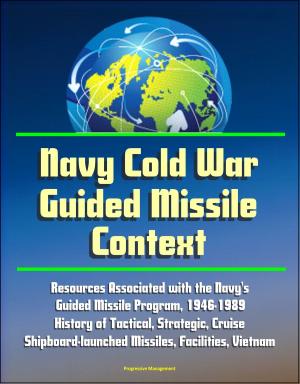Encyclopedia of American Intercontinental Ballistic Missiles (ICBMs) and Cold War Missile Weapons: Development and Operation, Atlas, Titan, Minuteman, Peacekeeper - Eight Official Histories
Nonfiction, History, Military, Nuclear Warfare, Aviation| Author: | Progressive Management | ISBN: | 9781311060402 |
| Publisher: | Progressive Management | Publication: | July 5, 2014 |
| Imprint: | Smashwords Edition | Language: | English |
| Author: | Progressive Management |
| ISBN: | 9781311060402 |
| Publisher: | Progressive Management |
| Publication: | July 5, 2014 |
| Imprint: | Smashwords Edition |
| Language: | English |
Eight official histories provide the complete story of America's ICBM forces in this massive ebook compilation: ICBM and Missile Summary (Space Primer Excerpt) * On Alert: An Operational History of the United States Air Force Intercontinental Ballistic Missile (ICBM) Program, 1945-2011 * The Development of Ballistic Missiles in the United States Air Force 1945-1960 * Inside the Cold War - A Cold Warrior's Reflections (ICBM Excerpt) * The United States Air Force and the Culture of Innovation, 1945-1965 (ICBM Excerpt) * An Examination of Intercontinental Ballistic Missile (ICBM) Development Within the United States from 1952 to 1965 * The Missile Plains: Frontline of America's Cold War * To Defend and Deter: The Legacy of the United States Cold War Missile Program.
ICBM and Missile Summary (Space Primer Excerpt) - This compilation opens with a concise historical overview of the ICBM program.
On Alert: An Operational History of the United States Air Force Intercontinental Ballistic Missile (ICBM) Program, 1945-2011 - On Alert is a fascinating look at a period in our nation's history that is too often overlooked. The vital role the ICBM played in keeping the peace in the Cold War era is increasingly less understood by our populace. The careful documentation of the past and present contribution of the ICBM force to global deterrence will ensure the lessons of this period are not forgotten.
The Development of Ballistic Missiles in the United States Air Force 1945-1960 - Although the development of ballistic missiles is largely an administrative history, it is also the story of the herculean efforts of several key individuals. The effort could not have succeeded as it did without the fortuitous appearance on the scene of Trevor Gardner, Gen. Bernard A. Schriever, and Dr. John von Neumann. How these men conceptualized, promoted, and directed the program forms the basis of the story.
Inside the Cold War - A Cold Warrior's Reflections (ICBM Excerpt) - ICBM combat crew alert was yet another dimension of Cold Warrior dedication and performance. Though the concept of missiles was entirely new to SAC veterans, they adapted quickly to the ICBM weapon systems. Snark, Bomarc, Thor, Atlas, Titan, and Minuteman came into SAC operations as smoothly as new aircraft systems had come in over the years.
The United States Air Force and the Culture of Innovation, 1945-1965 (ICBM Excerpt) - Missiles, and particularly ballistic missiles, were disruptive to the Air Force's culture, operations, and organization in several important ways. First, and most obvious, missiles had no pilots so they relegated humans simply to getting the missile somewhere within range of the target and then pushing a button.
An Examination of Intercontinental Ballistic Missile (ICBM) Development Within
the United States from 1952 to 1965 - Intercontinental ballistic missiles (ICBM) development by the United States from 1952 through 1965 is marked by extreme urgency. The initial impetus for the development did not proceed within military channels; this paper explores possible reasons why the military channels were not the originator of the program.
The Missile Plains: Frontline of America's Cold War - The story of the Minuteman missile program is a Cold War tale. Journalist Walter Lippmann's 1947 book, The Cold War, first used and popularized the term "cold war" to refer to the post-World War II confrontation between the United States and the Soviet Union.
To Defend and Deter: The Legacy of the United States Cold War Missile Program - The so-called strategic missiles, which included intercontinental ballistic missiles (ICBMs) and air-breathing strategic missiles (the predecessors of today's cruise missiles), were deterrent systems. In conjunction with the bombers of the Air Force's Strategic Air Command (SAC), the deterrent systems were intended to discourage an aggressor from attacking either the United States.
Eight official histories provide the complete story of America's ICBM forces in this massive ebook compilation: ICBM and Missile Summary (Space Primer Excerpt) * On Alert: An Operational History of the United States Air Force Intercontinental Ballistic Missile (ICBM) Program, 1945-2011 * The Development of Ballistic Missiles in the United States Air Force 1945-1960 * Inside the Cold War - A Cold Warrior's Reflections (ICBM Excerpt) * The United States Air Force and the Culture of Innovation, 1945-1965 (ICBM Excerpt) * An Examination of Intercontinental Ballistic Missile (ICBM) Development Within the United States from 1952 to 1965 * The Missile Plains: Frontline of America's Cold War * To Defend and Deter: The Legacy of the United States Cold War Missile Program.
ICBM and Missile Summary (Space Primer Excerpt) - This compilation opens with a concise historical overview of the ICBM program.
On Alert: An Operational History of the United States Air Force Intercontinental Ballistic Missile (ICBM) Program, 1945-2011 - On Alert is a fascinating look at a period in our nation's history that is too often overlooked. The vital role the ICBM played in keeping the peace in the Cold War era is increasingly less understood by our populace. The careful documentation of the past and present contribution of the ICBM force to global deterrence will ensure the lessons of this period are not forgotten.
The Development of Ballistic Missiles in the United States Air Force 1945-1960 - Although the development of ballistic missiles is largely an administrative history, it is also the story of the herculean efforts of several key individuals. The effort could not have succeeded as it did without the fortuitous appearance on the scene of Trevor Gardner, Gen. Bernard A. Schriever, and Dr. John von Neumann. How these men conceptualized, promoted, and directed the program forms the basis of the story.
Inside the Cold War - A Cold Warrior's Reflections (ICBM Excerpt) - ICBM combat crew alert was yet another dimension of Cold Warrior dedication and performance. Though the concept of missiles was entirely new to SAC veterans, they adapted quickly to the ICBM weapon systems. Snark, Bomarc, Thor, Atlas, Titan, and Minuteman came into SAC operations as smoothly as new aircraft systems had come in over the years.
The United States Air Force and the Culture of Innovation, 1945-1965 (ICBM Excerpt) - Missiles, and particularly ballistic missiles, were disruptive to the Air Force's culture, operations, and organization in several important ways. First, and most obvious, missiles had no pilots so they relegated humans simply to getting the missile somewhere within range of the target and then pushing a button.
An Examination of Intercontinental Ballistic Missile (ICBM) Development Within
the United States from 1952 to 1965 - Intercontinental ballistic missiles (ICBM) development by the United States from 1952 through 1965 is marked by extreme urgency. The initial impetus for the development did not proceed within military channels; this paper explores possible reasons why the military channels were not the originator of the program.
The Missile Plains: Frontline of America's Cold War - The story of the Minuteman missile program is a Cold War tale. Journalist Walter Lippmann's 1947 book, The Cold War, first used and popularized the term "cold war" to refer to the post-World War II confrontation between the United States and the Soviet Union.
To Defend and Deter: The Legacy of the United States Cold War Missile Program - The so-called strategic missiles, which included intercontinental ballistic missiles (ICBMs) and air-breathing strategic missiles (the predecessors of today's cruise missiles), were deterrent systems. In conjunction with the bombers of the Air Force's Strategic Air Command (SAC), the deterrent systems were intended to discourage an aggressor from attacking either the United States.















